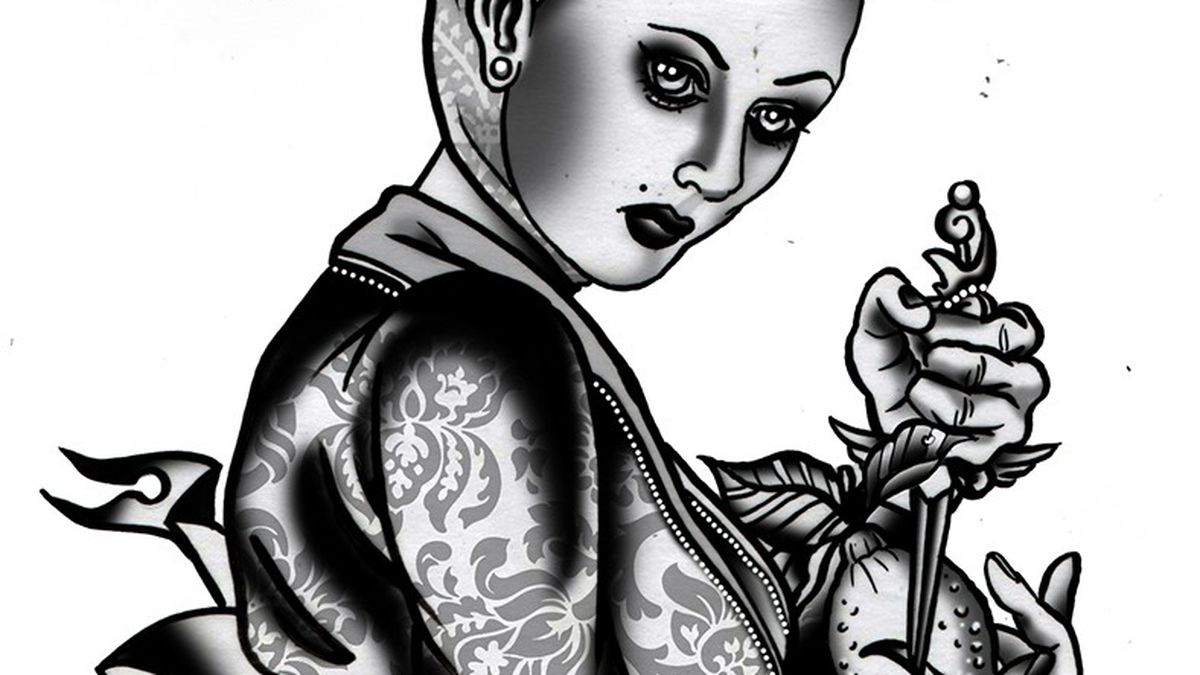What do tattoo art, veganism and Italian home cooking have in common? Maybe not a whole lot — unless you happen to be a vegan tattoo artist who grew up in Italy.
But these are the themes of Mama Tried: Traditional Italian Cooking for the Screwed, Crude, Vegan, and Tattooed, a new illustrated cookbook by Cecilia Granata, a Berkeley-based tattoo artist and freelance illustrator.
The book has been a long time in the making. In an interview, Granata explained that she gave up eating animal products many years before she started doing tattoos for a living. This was back in 2005, when Granata still lived in Milan, Italy, where at the time it seemed like no one was vegan, and even basic staples such as soy milk proved nearly impossible to get a hold of.
Despite that fact, Granata said she didn’t find the transition to veganism that hard. That’s because, like any good Italian, she learned how to cook for herself from an early age; her mother and nonna made sure of that. Mama Tried is a kind of love letter to that Italian home-cooking education.
Another reason Granata decided to tackle the project is because she came to the conclusion that there is more that connects veganism and tattoo art than just her own personal enthusiasm for both. Granata, whose day job is at the Albany location of Sacred Rose Tattoo, explained that vegans have formed a sizeable chunk of her customer base, and over the years, they’ve asked her to create an assortment of vegan-themed, “anti-cruelty” tattoos, some of which eventually made it into the book. (One of these, labeled “Cereal Killer,” features a grain-devouring tiger; the design covered a customer’s entire stomach, complete with a spoonful of cereal getting shoved into his belly button.)
More than that, Granata sees the “fresh-edgy-pop” look of her tattoo-style illustrations as a way to keep meat-free cooking fun, and to ease some of the “heaviness” that’s sometimes associated with vegan politics.
The cookbook spans multiple regions of Italy, and its one hundred-plus recipes include some that are naturally vegan (deep-fried chickpea fritters, for instance) and others that Granata has carefully “veganized”— though, given Italy’s famous salumi- and cheese-loving ways, it should come as no surprise that there are more of the latter than the former.
Dedicated vegans won’t be surprised to hear that Granata found cheeses to be the hardest thing to veganize — cheese being “a constant experiment, really, for every vegan,” she explained.
Her favorite recipe in the book? Granata cites the saffron-tinged risotto alla Milanese, because it’s the one dish that reminds her the most of her childhood.
I’ve yet to test any of the recipes in Mama Tried, so I won’t comment on their quality. I did appreciate that, in keeping with the traditions of rustic Italian cooking, Granata’s recipes tend toward simplicity — even despite the outsized presence of ingredients such as agar-agar, nutritional yeast, and various fake meat products.
That said, there’s plenty to recommend the book even if you treat it purely as an art object. Organized alphabetically so that the recipes jump from category to category (homemade limoncello followed by melanzane con capperi e olive, i.e. eggplant with capers and olives), the cookbook resembles a children’s picture book — for the kind of rad kid who’s into horned, vaguely demonic ladies with “Praise Seitan” tattooed across their chests.
Granata cites a variety of artistic inspirations, which include horror movies, skateboard culture, Renaissance paintings, Hindu iconography, and Mexican folk art. My favorite illustrations were the “veganized” versions of Renaissance portraits. In one interpretation of a Flemish painting, a well-to-do lady forms a heart shape with her fingertips, to go with a recipe for baci di dama (“lady’s kisses” cookies). The illustration for the limoncello recipe is a version of the 17th-century Italian painter Bernadino Mei’s “Ghismonda with the Heart of Guiscardo,” in which a young woman holds her lover’s heart, which has been stabbed with a dagger, in a little tray.
If ever there was a picture that made being vegan seem badass: In Granata’s version, the heart has been replaced with a lemon.
You can meet Granata and try her cooking at a book signing at the vegan shop Vegan Republic (1624 University Ave., Berkeley) on Friday, May 13, 6–8 p.m. Granata said she plans to prepare two cold “omelets,” two kinds of pizza, and a vegan chocolate “salami” to serve at the event.
















